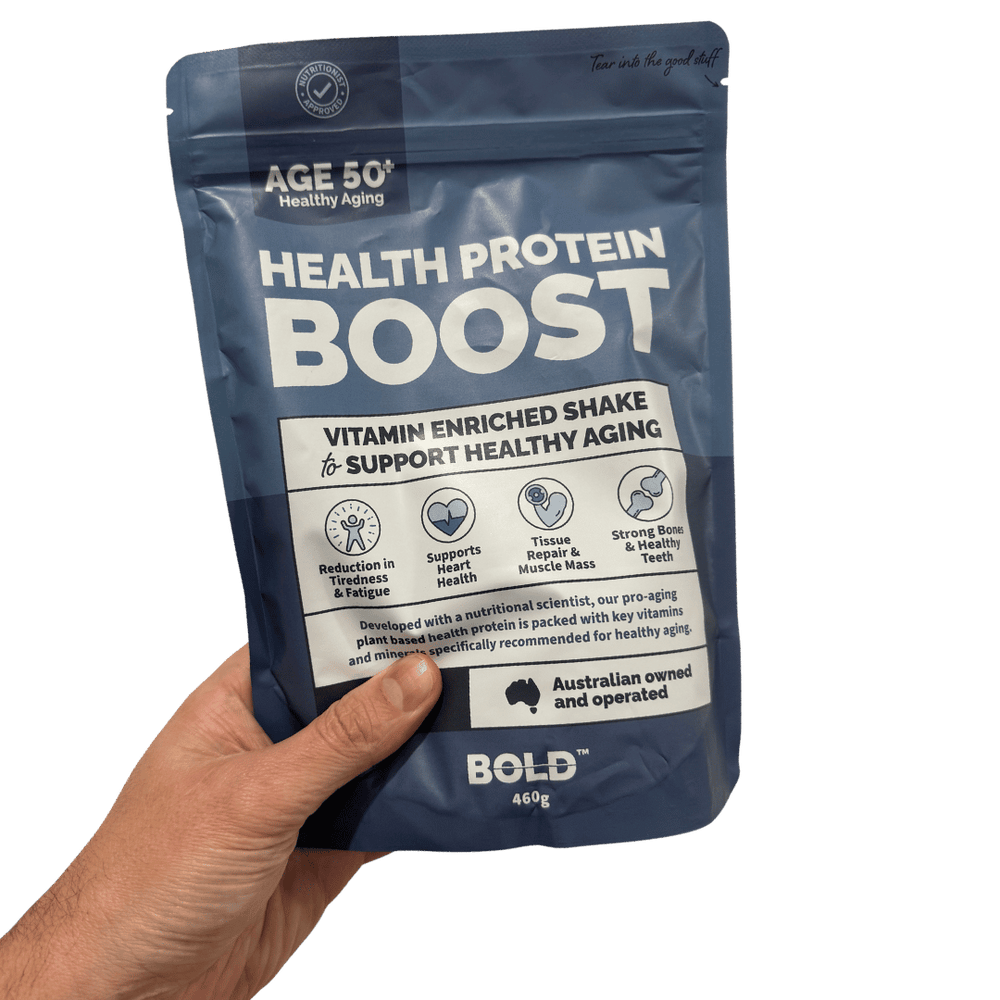Muscle Mass Matters: The Importance of Protein for Ageing
Why protein is crucial to healthy aging

Table of Contents
- Four Reasons Why Muscle Mass Matters
- Prevent Falls and Fractures
- Promote Bone Health
- Reduce Chronic Conditions
- Maintain Your Movement and Independence
- How Protein Can Help
- How does protein work
- Consuming enough protein
- Choosing the right protein powder
- Conclusion
Building strong muscle mass isn't just for athletes or gym lovers. It is equally important to stay healthy and strong as we get older!
As we age, particularly over the age of 55 years, it becomes increasingly important to focus on maintaining muscle mass. This is not just for vanity's sake – having strong muscles is crucial for our overall health and wellbeing. In this blog post, we will discuss why it is so vital to keep our muscles healthy as we get older. We will also look at the importance of protein in order to achieve this goal.
Four Reasons Why Muscle Mass Matters
As we get older our bodies naturally start shrinking with time; however, this process speeds up during late adulthood as a result of hormonal changes. From around the age of 30, our muscle mass decreases at a rate of 3-8%. This gradual loss of muscle mass is known as Sarcopenia and is a natural part of the aging process. But shockingly, this rate is accelerated after the age of 60!
Unless managed properly, the decline in muscle mass can be a major cause of disability as people age. This loss leads to weakness, fragility and lack of functionality which can lead to other chronic health conditions like diabetes or high blood pressure.
Maintaining muscle mass as we age is important for the following reasons:
1. Prevent Falls and Fractures
Firstly, having strong muscles helps to reduce our risk of falls and injuries. As we get older, it becomes increasingly easy to lose our balance and fall – something which can have serious consequences. In Australia, falls are the leading cause of unintentional injury in people over 65 years old.
Each year, almost 1 in 3 Australians experience a fall and of these 1 in 5 require hospitalisation. There are numerous reasons why someone may fall which may include blood pressure changes, certain medications and poor eyesight in addition to a natural change in balance and muscle strength. Maintaining healthy muscle mass not only can help prevent falls but can also help protect the body from injury, such as fractures, if a fall was to occur.
We also know from numerous studies, that hip fractures (commonly caused by falls) are strongly linked to premature death. According to a 2018 Australian study, the annual rate of death after a hip fracture is 23% but this mortality rate increases to 55% after 5 years.
2. Promote Bone Health
Muscles are not just important for strength and functionality – they are also essential for bone health. Bones and muscles work together to create stability and movement in the body. When one deteriorates, so does the other.
As we get older, it is common for bones to start weakening (known as Osteoporosis). This process also leads to an increased risk of fractures, particularly in the hip, spine and wrists. Osteoporosis alone is also a major cause of disability in older adults.
Maintaining strong muscles helps to preserve bone health by providing resistance against which bones can grow and become stronger.
3. Reduce Chronic Conditions
Muscle mass is also crucial for reducing the likelihood of developing chronic health conditions such as diabetes, heart disease and stroke. These conditions are far more common in older adults and can have a significant impact on their quality of life.
Type II Diabetes is has been directly linked to muscle mass showing those with low muscle mass are at a significantly higher risk of developing the condition. Similarly, heart disease is also associated with a decrease in muscle mass. In fact, numerous studies showing it to be an independent risk factor for heart disease.
Maintaining healthy muscles can help reduce our chances of developing these debilitating conditions and improve our overall quality of life as we age.
4. Maintain Your Independence
As we have seen, there are numerous reasons why it is so important to maintain our muscle mass as we get older. Perhaps the most desirable reason of all is that healthy muscles help us stay independent for longer.
Muscles are essential for performing everyday activities such as walking, getting up from a chair, carrying groceries, showering, putting out laundry and so on. You could conclude that maintaining a healthy muscle mass is important for your overall quality of life and mental wellbeing.
How Protein Can Help
In order to maintain muscle mass as we age, it is important to consume adequate protein on a daily basis. Protein is essential for building and repairing muscle tissue. Research has shown that protein intake is positively associated with muscle mass preservation in older adults.
How does protein work?
When you exercise, particular weight-bearing or resistance training exercises, your muscles will tear a little bit. But don’t worry this isn’t a bad thing. In fact, your muscles will grow back bigger and stronger after the workout is over with proper nutrition!
Protein plays an important role here. It is made up of little molecules known as amino acids and it is these amino acids that are the building blocks for creating strong muscles.
After performing any physical activity, this could be as much as walking up a flight of stairs, your body needs to repair any damage done to the muscles. The amino acids in protein will help rebuild any torn tissue and in the process, rebuild the muscle fibres back even stronger and bigger!
Consuming enough protein
In order to ensure you are consuming enough protein, try incorporating high-quality protein foods into your diet such as meat, fish, eggs, dairy products and legumes. If you are struggling to meet your daily protein target, consider using a protein supplement.
Protein supplements are an easy way to boost your daily protein intake and can be especially helpful if you lead a busy lifestyle or find it difficult to get adequate protein from food sources alone.
Choosing the right protein powder
There are numerous different types of protein supplements on the market which might be confusing for some.
When choosing a protein supplement, it is important to select one that is high in quality and that also suits your dietary needs. For example, if you are vegan or vegetarian, make sure to choose a plant-based protein supplement.
If you select a plant-based protein powder, it's also a good idea to select one that is a blended powder so that you get a complete blend of amino acids. For example a Pea Protein Isolate and Organic Brown Rice Protein which is found in our very own Bold Health Protein Plus.
It is also important to read the ingredients list carefully as some protein supplements may contain unhealthy additives or artificial sweeteners.
Conclusion
Maintaining muscle mass is crucial for ageing adults as it helps reduce the likelihood of developing chronic conditions, preserves bone health and improves the overall quality of life. In order to maintain muscle mass, it is important to consume adequate protein on a daily basis. Protein can be found in many different food sources but if you are struggling to meet your daily protein try adding protein powder into a delicious breakfast smoothie.

References
- https://www.ncbi.nlm.nih.gov/pmc/articles/PMC2804956/#:~:text=Muscle%20mass%20decreases%20approximately%203,to%20disability%20in%20older%20people.
- https://www.ncbi.nlm.nih.gov/pmc/articles/PMC4269139/
- https://www.healthdirect.gov.au/falls#why
- https://www.aihw.gov.au/getmedia/296b5bb1-0816-44c6-bdce-b56e10fd6c0f/aihw-phe-226.pdf.aspx?inline=true
- https://journals.lww.com/otainternational/fulltext/2020/03000/hip_fracture_care_and_national_systems__australia.7.aspx#:~:text=Annual%20mortality%20for%20hip%20fracture,%2Dyear%20mortality%20is%2055%25.
- https://www.health.harvard.edu/staying-healthy/strength-training-builds-more-than-muscles#:~:text=What%20many%20of%20us%20don,per%20year%20after%20age%2040.
- https://www.ncbi.nlm.nih.gov/pmc/articles/PMC5708784/
- https://www.ahajournals.org/doi/full/10.1161/atvbaha.116.307156
- https://medlineplus.gov/ency/article/002222.htm#:~:text=Amino%20acids%20are%20molecules%20that,down%2C%20amino%20acids%20are%20left.
- https://www.boldhealth.com.au/blogs/bold-blog/5-reasons-to-eat-more-plant-based-protein-health-benefits-easy-ideas
- https://www.boldhealth.com.au/products/bold-health-protein-plus-single
----------------------------------------------------------------------------------------------------------
Medical Disclaimer
The information provided in this blog post is for general information only, it is not intended as medical advice. For medical advice please consult with a qualified medical professional who is familiar with your individual medical needs.


